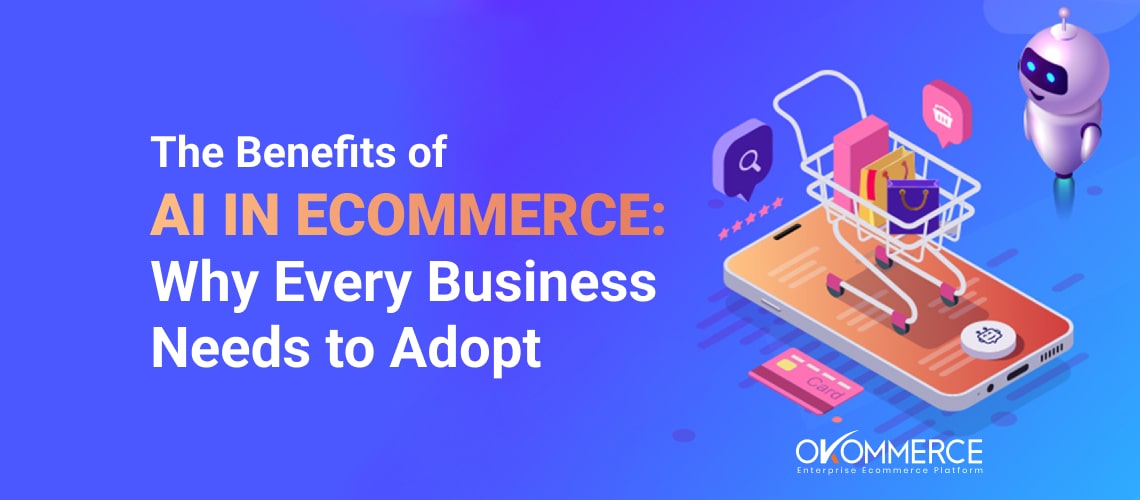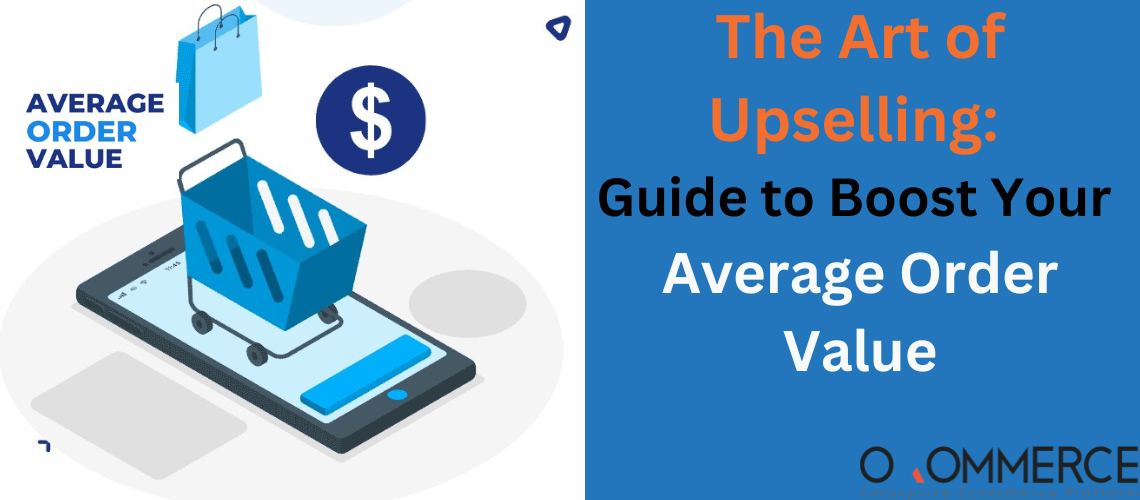The Benefits of AI in eCommerce: Why Every Business Needs to Adopt

Artificial Intelligence (AI) has been a buzzword for a while now, and its benefits have been touted in various industries, including eCommerce. As the world becomes more digitized, businesses are looking for innovative ways to streamline their operations and gain a competitive edge. The use of AI in eCommerce has revolutionized the way businesses interact with their customers, providing them with personalized experiences that were once impossible. In this article, we will explore the benefits of AI in eCommerce and why every business needs to adopt it to stay ahead of the competition.
Introduction to Artificial Intelligence (AI) in eCommerce

Artificial Intelligence (AI) has the potential to revolutionize the eCommerce industry, allowing businesses to streamline their operations, improve customer experiences, and gain a competitive edge. AI is a technology that enables machines to perform tasks that typically require human intelligence, such as perception, reasoning, learning, and decision-making. In eCommerce, AI can be used to automate processes, analyze data, and provide personalized experiences for customers. With the increasing importance of digital transformation, businesses need to adopt AI to stay ahead of the competition. In this article, we will explore the benefits of AI in eCommerce and provide examples of how businesses can use AI to enhance their operations and customer experiences.
AI's Roles in E-Commerce

AI plays a significant role in eCommerce, enabling businesses to automate processes, analyze data, and provide personalized experiences for customers. AI-powered tools and algorithms can be used to optimize inventory management, improve search results, and personalize product recommendations. AI can also automate customer service, reducing response times and improving customer satisfaction. Additionally, AI can detect and prevent fraudulent transactions, reducing the risk of financial loss for businesses. AI's predictive analytics capabilities can provide businesses with insights into customer behavior and market trends, allowing them to make better-informed decisions. Overall, AI's roles in eCommerce are diverse and critical, improving efficiency, reducing costs, and enhancing customer experiences. The use of AI in eCommerce is becoming increasingly important as businesses seek innovative ways to stay ahead of the competition in the digital age.
What is The Scope of The AI Market in E-Commerce?

The scope of the AI market in eCommerce is vast and expanding rapidly. According to a report by ResearchAndMarkets.com, the global AI in the eCommerce market was valued at USD 5.05 billion in 2020 and is expected to reach USD 20.83 billion by 2025, growing at a CAGR of 32.9% during the forecast period. The increasing demand for personalized customer experiences, the growing adoption of chatbots and virtual assistants, and the need for efficient supply chain management are some of the factors driving the growth of the AI market in eCommerce. Additionally, the emergence of new technologies, such as machine learning, natural language processing, and computer vision, is creating new opportunities for businesses to leverage AI in eCommerce. The scope of the AI market in eCommerce is vast and is expected to continue to expand as businesses seek to enhance their operations and improve customer experiences through the use of AI-powered tools and algorithms.
The Benefits of AI in eCommerce

Artificial intelligence (AI) has many advantages for eCommerce. Some of these advantages include:
Personalization
Personalization is one of the key benefits of AI for eCommerce. AI algorithms can analyze customer data, including purchase history, browsing behavior, and preferences, to offer personalized recommendations and experiences. Personalization can also help businesses stand out from the competition, as customers are more likely to choose brands that understand and cater to their individual needs. By using AI to provide personalized experiences, businesses can create a positive and memorable shopping experience for their customers, which can ultimately lead to long-term customer loyalty and increased revenue.
For example, an AI-powered eCommerce platform can recommend products to customers based on their purchase history and browsing behavior. This leads to a higher likelihood of customers purchasing products and returning to the site, resulting in increased sales and customer loyalty.
Customer Service
AI chatbots are becoming increasingly popular in eCommerce. They can handle a high volume of customer queries and provide immediate responses 24/7. With the help of natural language processing (NLP), AI chatbots can understand and respond to customer inquiries in real time. This leads to faster resolution times, improved customer satisfaction, and reduced workload for human customer service agents. AI also handles routine inquiries, such as order status updates, shipping information, and product recommendations, freeing up customer service representatives to focus on more complex issues.
For example, H&M uses an AI-powered chatbot named "Olivia" to provide personalized styling advice to customers. Customers can upload photos of their outfits, and Olivia provides recommendations for accessories and other items to complete the look. This personalized experience enhances customer engagement and satisfaction while also increasing sales for H&M. Overall, AI-powered chatbots are a cost-effective and efficient way to provide 24/7 customer service, improve customer satisfaction, and increase sales for eCommerce businesses.
Inventory Management
AI in eCommerce also provides significant benefits when it comes to inventory management. AI algorithms can analyze data from sales and inventory to predict demand and optimize inventory levels. This helps businesses reduce inventory costs and avoid stockouts. AI can also assist in identifying slow-moving products and providing recommendations for clearance sales or discounts. By using AI-powered tools, businesses can optimize their inventory management processes, reducing costs and improving efficiency.
For example, Amazon uses machine learning algorithms to predict demand for products and optimize their inventory accordingly. This enables them to keep popular items in stock, reducing the risk of stockouts, and also reducing the amount of slow-moving inventory they hold. Additionally, AI can be used to detect and prevent fraud in the inventory management process. For example, AI algorithms can analyze purchasing patterns and detect anomalies that could indicate fraudulent activity.
Overall, the use of AI in inventory management can lead to significant cost savings for businesses while also ensuring that popular items are always in stock, reducing the risk of lost sales.
Fraud Detection
Online fraud is a significant concern for eCommerce businesses. AI in eCommerce also plays a critical role in fraud detection and prevention. AI algorithms can help detect fraudulent activities in real-time, such as suspicious purchasing behavior, fake accounts, and payment fraud. This helps businesses protect themselves and their customers from fraudulent activities and reduce losses.
For example, PayPal uses AI to analyze transactions and detect potential fraud. The system can flag suspicious activity, such as purchases made from unusual locations or at unusual times, and alert the customer or merchant to investigate further. This helps to protect both the customer and the eCommerce business from potential losses due to fraud. By using AI for fraud detection, eCommerce businesses can reduce their risk of financial loss while also maintaining the trust of their customers.
Marketing and Advertising
AI can help eCommerce businesses optimize their marketing and advertising strategies. AI-powered algorithms can analyze vast amounts of customer data to provide insights into customer behavior, preferences, and interests. This information can then be used to create targeted marketing campaigns, such as personalized email campaigns and social media ads. AI can also help optimize advertising campaigns by adjusting bids, targeting, and creatives based on real-time data.
For example, Facebook's ad platform uses AI to analyze user data and target ads to users who are most likely to be interested in the product or service being advertised. This results in more effective and efficient ad campaigns, reducing ad spend while increasing conversions.
Overall, the use of AI in marketing and advertising can lead to increased customer engagement, higher conversion rates, and lower ad spend for eCommerce businesses.
Supply Chain Optimization
AI in eCommerce can also benefit businesses by optimizing their supply chain management. AI-powered algorithms can analyze data from multiple sources, such as sales history, weather forecasts, and supplier lead times, to predict demand and optimize inventory levels. This enables businesses to reduce inventory costs while also ensuring that popular items are always in stock.
For example, Walmart uses AI to optimize their supply chain management. The system analyzes sales data and weather forecasts to predict demand for products, and then optimizes inventory levels and shipping routes to reduce costs and ensure timely delivery. Additionally, AI can be used to monitor supplier performance, such as on-time delivery rates and quality control, and detect potential issues before they impact the supply chain.
Overall, the use of AI in supply chain optimization can lead to significant cost savings for businesses while also improving efficiency and reducing the risk of stockouts.
Product Recommendations
AI can improve the customer experience by providing personalized product recommendations. AI-powered algorithms can analyze customer data, such as purchase history and browsing behavior, to suggest products that are most likely to be of interest to the customer. This not only improves the customer experience but can also increase sales for the eCommerce business.
For example, Amazon uses AI to power their product recommendation engine. The system analyzes customer data, such as purchase history and browsing behavior, to suggest products that the customer is likely to be interested in. This has resulted in increased sales and improved customer engagement. AI can also be used to provide real-time product recommendations, such as suggesting complementary items at checkout or recommending products based on items that are currently in the customer's shopping cart.
Overall, the use of AI in product recommendations can lead to increased sales and improved customer satisfaction for eCommerce businesses.
Improved Search Results
AI can improve the customer experience by providing more accurate and relevant search results. AI-powered algorithms can analyze customer search queries and browsing behavior to provide more personalized and context-specific search results. This leads to higher conversion rates and grows customer satisfaction.
For example, eBay uses AI to power their search engine. The system analyzes customer search queries and browsing behavior to provide more relevant and accurate search results. Additionally, AI can be used to provide visual search capabilities, such as allowing customers to upload a photo and find similar products. This improves the customer experience and can also increase sales for eCommerce businesses.
Overall, the use of AI in search results can lead to increased customer engagement and satisfaction, as well as improved sales for eCommerce businesses.
Predictive Analytics
AI-powered predictive analytics can help eCommerce businesses forecast demand, identify trends, and make informed decisions. By analyzing data from various sources, including sales, inventory, and customer behavior, AI can provide insights into future demand and trends, helping businesses make informed decisions on inventory management, pricing, and marketing strategies.
For example, Zulily, an online retailer, uses AI to analyze customer data and predict which products are likely to be popular in the future. This enables them to proactively source those products and reduce the risk of stockouts. Additionally, AI can be used to predict customer lifetime value, enabling businesses to better target their marketing efforts and improve customer retention.
Overall, the use of AI in predictive analytics can lead to more informed decision-making, improved strategy, and increased revenue for eCommerce businesses.
Competitive Advantage
Lastly, adopting AI in eCommerce can provide businesses with a competitive advantage. By leveraging the power of AI, businesses can improve their customer experience, optimize their supply chain, and make informed decisions. This can lead to increased sales, improved customer satisfaction, and a higher market share.
For example, Sephora, a cosmetics retailer, uses AI to power their Virtual Artist tool, which allows customers to try on makeup virtually. This provides a unique and personalized customer experience that sets them apart from their competitors. Additionally, AI can be used to automate repetitive tasks, such as customer service inquiries, which frees up employees to focus on more strategic tasks. This can raise efficiency and provide a excellent customer experience.
Overall, the use of AI in eCommerce can provide businesses with a competitive advantage by enabling them to differentiate themselves from their competitors and provide a more personalized customer experience.
In conclusion, the benefits of AI in eCommerce are significant and cannot be ignored. From personalization to inventory management, fraud detection, marketing, and supply chain optimization, AI has the power to transform businesses' operations and improve the overall customer experience. Every business needs to adopt AI to stay competitive and reap the benefits it offers.
okommerce.com for use AI in eCommerce
Okommerce.com is a Secure eCommerce Platform based in Dubai. As a leading eCommerce platform Dubai we uses AI technology to provide a seamless shopping experience for customers. This cloud based ecommerce platform utilizes AI algorithms to analyze customer data and shopping behavior, enabling it to provide personalized product recommendations, customized search results, and targeted marketing campaigns. Additionally, Okommerce.com's AI-powered chatbots provide 24/7 customer support, helping customers with their queries and issues in real-time. With the use of AI technology, Okommerce.com can optimize inventory management, reduce fraudulent activities, and improve customer retention rates. As a result, customers can enjoy a more personalized and efficient shopping experience, while businesses can achieve higher sales and profitability.




